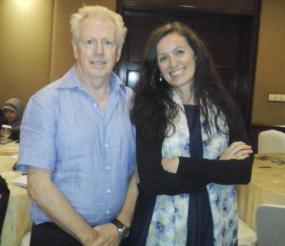Endeavor Global held an international conference in Jakarta in February to select the newest members of its entrepreneur network. One member of Endeavor’s International Selection Panel at the event was Dave McClure. A venture capitalist who has been a founding partner with hundreds of companies, McClure runs a seed capital and incubator program in Mountain View, California – the heart of Silicon Valley. He has invested in over 250 startups including Simply Hired and SlideShare.
With over twenty years of experience working in Silicon Valley, McClure has been a software developer, entrepreneur, startup advisor and investor, blogger and Internet marketer. He was a Director of Marketing at PayPal from 2001 through 2004. Prior to that he was a database consultant and programmer for several companies including Microsoft and Intel. During the Endeavor event, he spoke to Strategic Review about the future of startups and entrepreneurship in Indonesia.
What do you think of the startup atmosphere in Indonesia? I think it’s still pretty early. We’re still learning about what’s going on here locally. I think the market is still developing and the local entrepreneur community is still learning about themselves and trying to get more people involved in the ecosystem.
What are you specifically looking for in a startup in Indonesia? Well, with any startup we are looking for people who have a product or service that looks promising, have some initial customers and usage and are then looking for talented entrepreneurs who can grow the business. Particularly from our perspective, we are looking for engineering, design and marketing talents for online products, probably consumer commerce, mobile apps and probably also access tools for business, cloud-based products for business.
You have invested in a lot of startups. So, what are the challenges you think Indonesian startups have? Well, in Silicon Valley we benefit from having a very long history of entrepreneurship and a lot of access to resources, both capital and talent as well as platform companies and mentors that are pretty much all around us. In other parts of the world, not unique to Indonesia but any place which is not Silicon Valley, we have probably less access to capital, there are not too many investors, there is not much familiarity with doing startups.
So there may be capital availability, there may be a lot of family businesses which made a lot of money in real estate or natural resources but they maybe are not familiar with investing in tech. So that makes them either over cautious in investing in tech or too overconfident in investing in tech, neither of which is necessarily a good thing for the long term. On the entrepreneur side there is maybe not as much experience in doing Internet businesses, so there are limited mentorship opportunities. But I do think there are tremendous growth opportunities here in Indonesia. The consumer market is obviously very large, growing Internet penetration for Internet services, mobile phones, a growing middle class community with a very young population which is very social. So a lot of the dynamics for market opportunities here in Indonesia are great, but a lot of the fundamentals for mentoring startups and providing capital to startups are still maybe early and somewhat challenging.
You mentioned there is not much experience in investing in tech. What’s actually the difference between investing in tech and investing in other businesses? Well, I think just different expectations in terms of growth and success. So, in traditional businesses you might have a success rate of 50-70 percent and a failure rate around 10, 20, 30 percent and modest returns. In Internet businesses you see failure rate of 50-80% and you maybe see modest wins 10, 20 percent of the time. But then occasionally you see these really amazing 20x, 50x returns, but they only happen 5-10 percent of your time. So it’s a very skewed sort of return, a very high rate of failure which is kind of different from a lot of businesses. It tends to lend itself towards a more diversified strategy, maybe a larger number of investments and smaller dollars per investment and then kind of feeding the ones which are doing well and winning. There are also just a lot of opportunities to take advantage of the growth with the Internet but maybe this is not as common to people who haven’t seen that happen before. And so some are doing aggressive organic marketing around social platforms, some are doing paid acquisitions in places where there are good unit economics, those are maybe not too familiar to people who are more used to traditional business models or traditional print media and television advertising.
Why is the failure rate so high in tech? I think because technology is kind of fitting solutions into existing business models. They are just really young company risks not just technology company risks, but there are a lot of people who are maybe big dreamers, coming up with ideas that are untested. So in a lot of ways, the future is hard to see for technology. When you are building a house, you kind of know how a house looks like. If you are delivering consulting services, maybe you know how those consulting businesses look like. But when you’re building technology products it’s not always clear what you’re building and who is going to buy them. It might not be obvious what your margins are or whether you can improve the margins over time. So there are a lot of very dynamic variables in technology businesses that are possibly positive, possibly negative, but not always easy to predict.
I see from this Endeavor event that there are a lot of startups but from different industries. So from what kind of industries do Indonesian startups need to be in? We looked at a lot of industries that are tech related and a lot that are very straight forward that aren’t tech related because Indonesia is a big country. There is a lot of growth happening in startups and not all are going to be in technology. There is a lot of growth in straight forward businesses, probably transportation, public utilities, real estate and other industries that are not tech related.
But I think because the population is very social and very young, a lot of the purchases even from the traditional type of businesses might happen through technology platforms. So you might have a lot of traditional businesses that have a very thin or lightweight technology component mainly around customers communicating with businesses or how they purchase or understand or learn about products. So in that sense, almost every business could be a tech business at least on the customer interaction side and maybe getting to those customers could be improved by using technology platforms and social platforms.
What are your tips for entrepreneurs in Indonesia? Sometimes I see a lot of entrepreneurs in other countries focusing a little too much on the US market, and more global markets that are very big business and dollars and that’s great, there’s a lot of opportunities there. But in places like in Indonesia where it’s already a big market and already a lot of growth going on, I would be trying to understand local market needs that can scale up. And a lot of the businesses that maybe have been built in the US or Europe haven’t always been built over here.
There might be a lot of very successful business models from the US that people can take and customize or adapt to local markets. So businesses in food delivery, transportation, real estate, companies like Uber, Airbnb, Craigslist or eBay, a lot of those opportunities might be here in Indonesia where those companies might have a tougher time exploring this market because it’s new and unfamiliar and local entrepreneurs might be able to succeed based on their areas of familiarity.
I would definitely be looking at things that are sustainable and revenue generating. One of the other things I would suggest for the international market is to look at revenue generating businesses maybe over growth markets because capital availability may or may not be as common as in Silicon Valley, where it’s not obvious where you would get funding, you may want to be looking at customer-driven revenue sources as well as capital sources.
What is the advice you can give to people who want to invest in Indonesian startups? Generally I advise people who want to invest in startups that they would probably be better off burning their money instead, ha ha ha. I think historical returns for investment capital or angel investor are challenging for a lot of people. If they still want to invest in startups, I would say don’t concentrate your investment in small number of companies, I would probably look at 10 to 20 investments to diversify across, again because the failure rates are very high. So a strategy that I may think about is figure out if you’ve got a budget that you want to invest in startups, cut that in half, and then cut that by 10-20 percent, and that might be your average investment for each company. And then once you’ve seen the 10-20 investments and whether there’s success or not, maybe divide the remaining half of the money with the ones that are working. So let’s say you have $200,000 to invest in startups, maybe take $100.000 for the first 10-20 companies, and put $5-10,000 in each and then in a couple of years, maybe three of those ten companies are still alive or doing well; then take the other $100.000 and put $25-30,000 into each of those that are doing well.










 resized.png)
